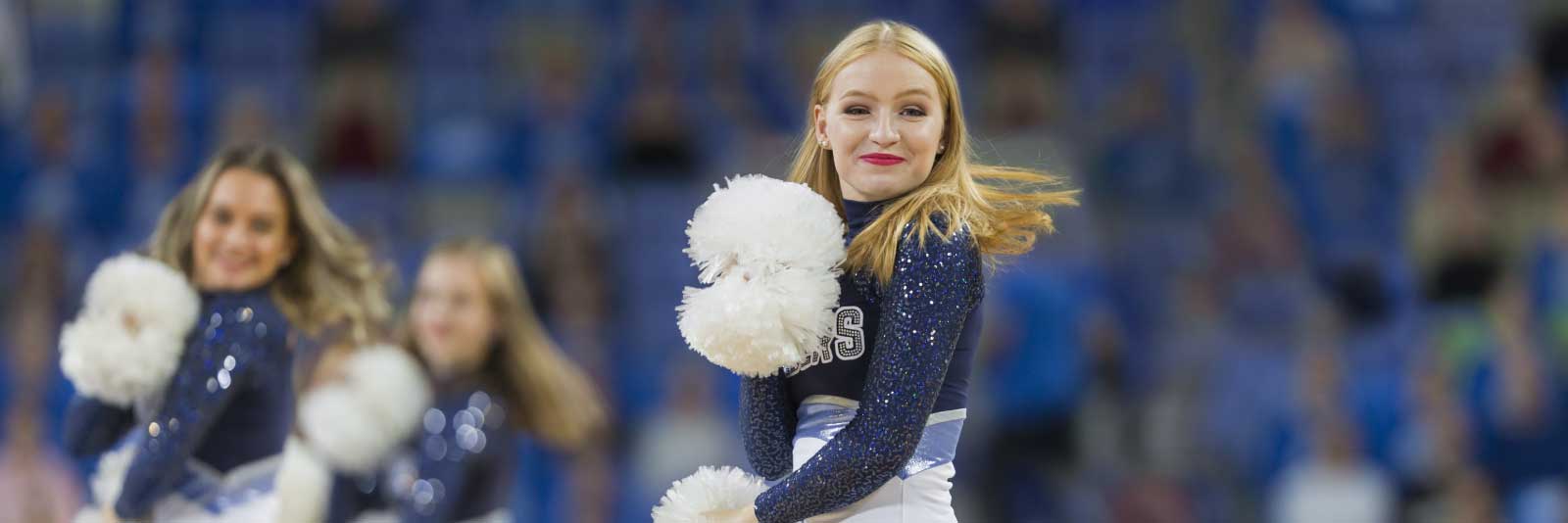
Cheer Camps and Cheer Clinics
Student-athletes interested in competing in college can learn valuable skills and gain college coach exposure by attending cheer camps. We lay out the difference between camps and clinics and other FAQs to help you narrow down your options. Then use our event finder to find cheer clinics or cheerleading camps near you.
FAQs about cheerleading camps
- What happens at cheer camp?
- Summer cheerleading camps
- What are some of the best cheerleading camps?
- College cheer clinics
- What is a cheer clinic?
- What happens at a cheer clinic?
- How to choose a cheer camp to attend
What happens at cheer camp?
At cheerleading camps, squads learn new skills, solidify their bond and take their program up a notch. College cheerleading camps also give squads a chance to meet other teams and see how they compare, from a competitive standpoint. As the season progresses, remember to check with camp organizers for the most current information on camp availability and receive timely news about the cheerleading program.
Summer cheerleading camps
Summer cheerleading camps provide a structure designed to take squads to the next level and help deepen bonds among teammates. Summer camps can vary in length, but several are overnight and take place over two to three days. Some camps are held at facilities, while others are located on college campuses. The skills that are evaluated and taught also depends on the camp, but mostly, every squad walks away with improved technique and new skills for their routines. Student-athletes often attend camps with their club or high school cheerleading teams.
Here are common avenues teams take to attend summer cheerleading camps:
- Universal Cheerleaders Association (UCA): UCA offers a variety of camps, including elite camps, Spirit Xpress camps, stunt camps, day camps and overnight camps. Popular UCA camps take place on campuses at top college programs across the country, including the University of Kentucky and University of Alabama. These camps usually provide workshops for each squad, specialized stunt and pyramid training, sideline private coaching and team-building activities. There are also jump classes, dance classes and stunt classes available.
- National Cheerleaders Association (NCA): Similar to UCA, NCA provides a variety of camp options for squads, including overnight camps, day camps, performance camps, choreography camps and college camps, with some of the most popular NCA camps taking place on campus at top college programs across the country, including the University of Louisville. College camps can range from two to four days long and include lodging and meals. These camps focus on performance and training to improve core stunts, pyramids, chants, dance skills and jumps. Teams receive up to four personalized evaluations and are taught up to 10 new chants from experienced staff members.
What are some of the best cheerleading camps?
Cheer camps are offered for teams through the UCA, as well as the NCA. Both programs provide a variety of camp types, but for competitive, high-level squads, each have elite camps that can significantly improve a team’s skillset and routine.
One of UCA’s best camp cheerleading camps is the Spirit Xpress, which takes place at the University of North Carolina in Chapel Hill. UCA Spirit Xpress camps focus on advanced cheerleading elements, helping recruits improve their game-day stunting, pyramids, tumbling skills and overall cheer skills.
The biggest NCA camps take place on college campuses, as well. These camps provide the latest training in technique, focus on stunt and pyramid curriculum and pay careful attention to dance and jump skills. Top programs with NCA cheerleading camps include Texas Tech University, the University of Louisville, Oklahoma State University, Ohio State University and the University of South Carolina.
College cheer clinics
College cheer clinics are much different than cheerleading camps. Cheerleading camps are team-based, where the entire squad attends to learn valuable skills that will improve their routines, specifically around stunts, tumbling and pyramid.
What is a cheer clinic?
Cheer clinics are often referred to as cheer prep clinics because they’re designed to teach recruits what skills and routines will be performed at that school’s cheer tryouts. Coaches cover sideline cheers and stunts, and the desired qualifications needed in each position.
What happens at a cheer clinic?
At a cheer clinic, coaches cover college-level cheers and stunts, including baskets, pyramids, tumbling and the desired qualifications needed in each position.
Some colleges may kick off fall with fall tryout clinics and then provide another clinic in the spring before official tryouts in April or May. Other schools may offer just one or two clinics before spring, in January or February. It just depends on the school’s schedule.
How to choose a cheer camp to attend
Before signing up for camp, it’s important for both coaches and student-athletes to do their research and ask important questions that will ultimately shape their camp experience.
For example, what specific new skills does the squad want to learn? Are they primarily focused on improving their pyramid, or do coaches want to find ways to boost technical skills around tumbling and jumps? If a squad’s team needs improvement on stunts, a multiple-day camp will provide the time needed to teach athletes the fundamentals of these more advanced skills.
Overnight camps can become costly. That’s why location and the camp’s length are leading factors in this decision. Resident camps can cost up to $400 per cheerleader, not including the cost to travel. Plus, with many of the popular UCA and NCA camps taking place on college campuses, it’s important for student-athletes to map out their top schools first, so they can go to camps at schools they’re interested in and see the campus in person.
Sign up for your free NCSA Recruiting Profile to start getting on college coaches’ radar!